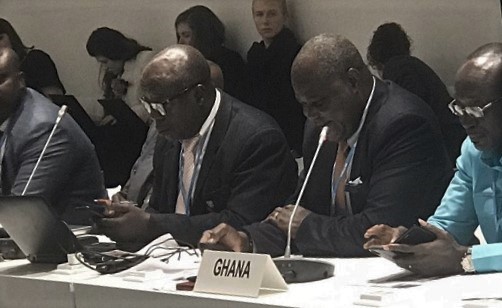
Ghana reduces emissions by 2 million tonnes
Ghana recorded two million tonnes emissions reductions per annum from 2011 to 2017 through the implementation of its national mitigation policies.
This was achieved out of the country’s commitment to unconditional reduction of emission by 15 per cent below Business As Usual (BUA) emissions of 74 million tonnes by 2030.
This was contained in the country’s second Biennial Update Report (BUR) presented at the Climate Change Conference (COP 25) currently underway in Madrid, Spain.
Presentation
The Acting Executive Director of the Environmental Protection Agency (EPA), Mr John A. Pwamang, presented the report at the eighth Workshop of Facilitative Sharing of Views at the ongoing Climate Change Conference in Spain.
The report, however, indicated that Green House Gas (GHG) emissions had increased by 7.1 per cent since 2012.
According to Mr Pwamang, rising population and urbanisation, carbon-intensive economic growth and diversification, deforestation, road transportation, thermal electricity generation and solid waste disposal were key drivers of Ghana Green Gas emission trends.
He said in order to reverse the trends, Ghana had embedded her Climate Agenda for 2030 (Nationally Determined Contributions) into Ghana’s National Medium Term Development Plan 2017-2021.
“Additionally, Ghana has set aside 20 mitigation actions on forest plantation and fossil-fuel thermal power plants and 18 conditional mitigation action in forestry, energy, waste, transport and industry to achieve its emission goals,” the report said.
The report further revealed that clean cooking, reduced natural gas flaring and reductions from electricity generation were the highest contributors to emission savings which resulted in a cumulative total of 13.7 million tonnes from 2011 to 2017.
Briefing
Briefing the workshop on enhancing inter-sectoral and development partner coordination, the Acting Director of Environment at the Ministry of Environment, Science, Technology and Innovation, Mr Peter Dery, stated that Ghana had over the years improved on coordination through inter-sectoral committees and working groups.
He said the Ministry of Finance had developed a tool to track all financial inflows from development partners to ministries, departments and agencies (MDAs).
That, he said, would be extended to cover civil society organisations and the private sector.
Opening the workshop, the Executive Secretary of the United Nations Framework Convention on Climate Change (UNFCCC), Ms Christian Patricia Espanosa, called for increase in ambition to enable parties to meet the global target of reducing global warming to two degrees against pre-industrial level and the Sustainable Development Goals.
